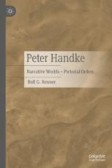Search
Search Results
-
The Satirical Rhetorics of [Re]Tweeting Birds
This chapter reins together a range of avian voices on Twitter and analyzes the conceptual and comedic output of accounts claiming to be run by birds...
-
Animals and Animality in Saki’s Satirical Short Stories
The British writer Hector Hugh Munro (1870–1916), who published under his pen name Saki, is to this day mostly known for the fable-like satirical...
-
The Lacking Satirical Animals of Mary Shelley’s The Last Man
Mary Shelley’s novel The Last Man can be read as a satire of nineteenth-century British politics. Shelley uses her characters’ ambiguous animality to...
-
“Thanks a lot, big brain”: Satirical Misanthropy in Kurt Vonnegut’s Galápagos
This chapter examines Kurt Vonnegut’s novel Galápagos as develo** a form of misanthropy whereby the evolutionary malfunctions of Homo sapiens are...
-
A writing style-based multi-task model with the hierarchical attention for rumor detection
With the development of the Internet and social media, the harm caused by rumors has become more and more serious. Existing rumor detection methods...

-
Barthold Heinrich Brockes and Nature Writing
Historical studies in search of nature writing in German literature occasionally mention the Early Enlightenment poet Barthold Heinrich Brockes, who...
-
The Thrill of the Chaise: Gendering the Phaeton in Eighteenth-Century Literary and Satirical Culture, c.1760–1820
Deidre Lynch in The Economy of Character argues that the “new ‘world of moving objects’ was one in which new forms for imagining and enforcing social...
-
Dark Comedies/Dark Universities: Negotiating the Neoliberal Institution in British Satirical Comedies The History Man (1981), A Very Peculiar Practice (1986–1988), and Campus (2011)
In this chapter, three British satirical comedies about universities are examined. These are The History Man (1981), A Very Peculiar Practice...
-
Rorty’s Kind of Writing: Style, Genre, and Rhetoric
It is widely agreed that Rorty’s enduring influence is due not only to his ideas but also to how he presented them in writing. This chapter is the...
-
Introduction: “Writing Is the Divine Revelation”
As a facet of Blake’s creative output alongside his pictorial art and printmaking, his writings are prodigious. While considerable scholarly...
-
“A green Parrot for a good Speaker”: Writing with a Birds-Eye View in Eliza Haywood’s The Parrot
After publishing The Female Spectator between 1744 and 1746, a periodical widely considered to be one of the first periodicals written by women for...
-
Ne Plus Ultra: Textbooks and Writing
Minchin was renowned for his skill as an educator, both as a lecturer to his students and as a writer of widely circulated textbooks. Foremost among...
-
Gender Controversy in Women’s Writing
The medieval and early Tudor gender controversy included female authors and voices that ranged from dignified defenses to shrewish ripostes,...
-
Automated Text Generation and Summarization for Academic Writing
In this chapter, we discuss the implications of automatic text generation for academic writing. We first review the current state of the technology...
-
Introduction: But What Is the Point of Courtly Writing?
Inquiring into the nature of literature can lead to multiple, non-exhaustive answers. Nevertheless, the above question haunts this book. The many...
-
A Career in Professional Writing
Professional writers, regardless of whether they are employed directly by a business or engaged on a casual basis, require a professional approach...
-
The Spaces in Which I/Eye Gaze: J.C. Mangan’s Satirical Appropriation of Colonial Views
Colonial appropriations of colonised subjects’ lands translated into a deformed portrayal of both lands and colonised peoples. Postcolonial theory...
-
Rorty’s Kind of Writing: Style, Genre, and Rhetoric
It is widely agreed that Rorty’s enduring influence is due not only to his ideas but also to how he presented them in writing. This chapter is the...
-
Disinformation detection on social media: An integrated approach
The emergence of social media platforms has amplified the dissemination of false information in various forms. Social media gives rise to virtual...

-
The Transformation of One’s Own Writing
The text, written in 1994, forms a central mediating link between Handke’s fictional texts and the author’s authentic notes. It is linked to both in...
